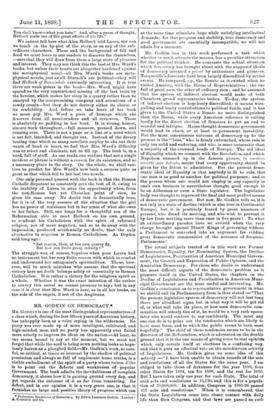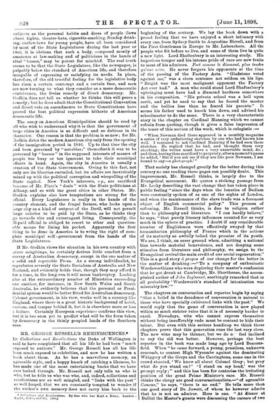MR. GODKIN ON DEMOCRACY.*
Mn. GODKIN is one of the most distinguished representatives of a class which, during the last fifteen years of American history, has unhappily been as a voice crying in the wilderness. No party was ever made up of more intelligent, cultivated, and high-minded men, and no party has apparently ever failed more utterly to impress its ideas on the nation.—At least, so one seems bound to say at the moment, but we must not forget that while the seed is being sown nothing looks so hope- lessly barren as a ploughed field.—Mr. Godkin's work, so care- ful, so critical, at times so overcast by the shadow of political pessimism and always so full of unpleasant home truths, is a visible embodiment of the spirit of a party whose raison d'être is to point out the defects and weaknesses of popular Government. The book admits the inevitableness of complete democracy, it shows how it is gaining ground every day, and yet regards the outcome of it as far from reassuring. Its defect, and in our opinion it is a very grave one, is that it furnishes no large and positive theory of progress which can • Unforeseen Tendencies of Donwracy. By Edwin Laurence Bodkin. London : A. Constable and Co.
at the same time stimulate hope while satisfying intellectual demands; for that progress and stability, true democracy and good government are essentially incompatible, we will not admit for a moment.
Mr. Godkin has in this work performed a task which whether or not it attracts the masses, has a peculiar attraction for the political thinker. He contrasts the actual situation which democracy has brought about with the supposed ideals of democracy invented a priori by enthusiasts and pioneers. Tocqueville's forecasts have been largely discredited by actual events. He compared, e.g., the Senate as it existed when he visited America, with the House of Representatives ; the one full of great men, the other of ordinary men ; and he assumed that the system of indirect election would make of both Chambers grand representative bodies. To-day, the system of indirect election is hopelessly discredited; it means wire- pulling and heavy contributions to political funds, and it has given to the United States a Senate no more distinguished than the House, while every American reformer is calling loudly for the direct election of Senators to put an end to scandal and intrigue. Maine thought democratic government would lead to chaos, or at least to permanent instability. But the most conspicuous outcome of democracy up to the present is the "boss," who is firmly entrenched, whose rule is only too solid and enduring, and who is more autocratic than a majority of the crowned heads of Europe. The old ideal of Equality which we connect with the Revolution, and which Napoleon summed up in the famous phrase, la carriere
ouverte aux talents, meant that every opportunity should be given for the fittest to administer. But the present demo- cratic ideal of Equality is that anybody is fit to rule, that one man is as good as another for political purposes ; and so the person whom one would not employ in any capacity in one's own business is nevertheless thought good enough to be an Alderman or even a State legislator. The legislative body was thought to represent the final and most perfect means of democratic government. But now, Mr. Godkin tells us, it is not only in a state of decline (which is also true in Continental Europe), but it is positively feared by great numbers of persons, who dread its meeting, and who wish to prevent it by law from meeting more than once in five years ! To what an extraordinary paradox have we arrived when the very charge brought against Stuart Kings of governing without a Parliament is converted into an argument for ridding great democratic communities of the nuisance of frequent Parliaments !
The actual subjects treated of in this work are Former Democracies, Equality, the Nominating System, the Decline of Legislatures, Peculiarities of American Municipal Govern- ment, the Growth and Expression of Public Opinion, and the Australian Democracy. For those who desire to understand the most difficult aspects of the democratic problem as it presents itself in the United States, the chapters on the Decline of Legislatures and Peculiarities in American Muni- cipal Government are the most useful and interesting. Mr. Godkin's conclusion as to representative government in what we should call its Parliamentary form is thus stated:—" That the present legislative system of democracy will not last long there are abundant signs, but in what way it will be got rid of, or what will take its place, or how soon democratic com- munities will utterly tire of it, he would be a very rash specu- lator who would venture to say confidently. The most any one can do is to point out the tendencies which are likely to have most force, and to which the public seems to turn most hopefully." The chief of these tendencies seems to be in the direction of the Referendum, which is advocated on the double ground that it is the one means of giving voice to real opinion which only reveals itself at elections in a confusing way, and that it puts an effectual veto on the mischievous activity of Legislatures. Mr. Godkin gives us some idea of this activity :—" I have been unable to obtain records of the acts and resolutions of all the States for the same year. I am obliged to take those of Arkansas for the year 1893, four other States for 1894, ten for 1896, and the rest for 1895, But I have taken only one year for each State. The total of such acts and resolutions is 15,730, and this is for a popula- tion of 70,000,000. In addition, Congress in 1895-96 passed 457 acts and resolutions." When it is remembered that the State Legislatures come into closer contact with daily life than does Congress. and that laws are passed on such
subjects as the personal habits and dress of people (laws about tights, theatre-hats, cigarette-smoking. Sunday drink- ing, curfew-laws for young people, have all been considered by most of the State Legislatures during the last year or two), it is obvious that such a body, composed mostly of amateurs at law-making and of politicians in the hands of rival "bosses," may be potent for mischief. The real truth seems to be that the State Legislature, like the newspaper, is palpably below the standard of American life, and therefore incapable of expressing or satisfying its needs. In place, therefore, of the old trustful feeling for the legislative body has risen a certain contempt and a certain fear, and men are now turning to what they consider as a more democratic contrivance, the Swiss remedy of direct democracy. Mr. Godkin does not tell us whether he thinks this will prove a remedy; but he does admit that the Constitutional Convention and direct vote on amendments to State Constitutions have proved the best political expression hitherto of American democratic life.
The essay on American Municipalities should be read by all who wish to understand why it is that the government of large cities in America is so difficult and so dubious in its character. One reason is that the problem is so new ; for Mr. r..lodkin dates the modern American city only from the opening of the immigration period in 1846. Up to that time the city had been governed by "notables;" thenceforth it was to be governed by " bosses " in the supposed interests of masses of people too busy or too ignorant to take their municipal affairs in hand. Again, the city in America is usually a creation of the State Government. Owing to this fact, not only are its liberties curtailed, but its affairs are inextricably mixed up with the political corruption and wirepnlling of the State capital. New York's interests, e.g., are sacrificed because of Mr. Platt's " deals " with the State politicians at Albany, and so with the great cities in other States. Mr. Godkin explains also how temptations are strong for the official. Every Legislature is really in the hands of the country element, and the frugal farmer, who looks upon a ',arge city as a kind of outpost of the Devil, will not permit large salaries to be paid by the State, as he thinks they go towards vice and extravagant living. Consequently, the ill-paid official is obliged to resort to other and question- able means for lining his pocket. Apparently the first thing to be done in America is to wring the right of com- plete municipal self - government from the hands of the State Legislatures.
If Mr. Godkin views the situation in his own country with grave misgivings, he certainly derives little comfort from a survey of Australian democracy, except in the one matter of a solid and reputable Press. As a strong individualist, he reprobates severely the State Socialism of Australia and New Zealand, and evidently holds that, though they may afford it for a time, in the long-run it will mean bankruptcy. Looking also at the extraordinary number of Ministries succeeding one another, for instance, in New South Wales and South Australia, he evidently believes that the personal or Presi- dential system would be better fitted for Australian democracy. Cabinet government, in his view, works well in a country like England, where there is a great historic background of habit, custom, and temper behind it, but it is elsewhere more or less n failure. Certainly European experience confirms this view, but it is too soon yet to predict what will be the form taken by democracy in the thinly peopled lands of the Southern seas.







































 Previous page
Previous page